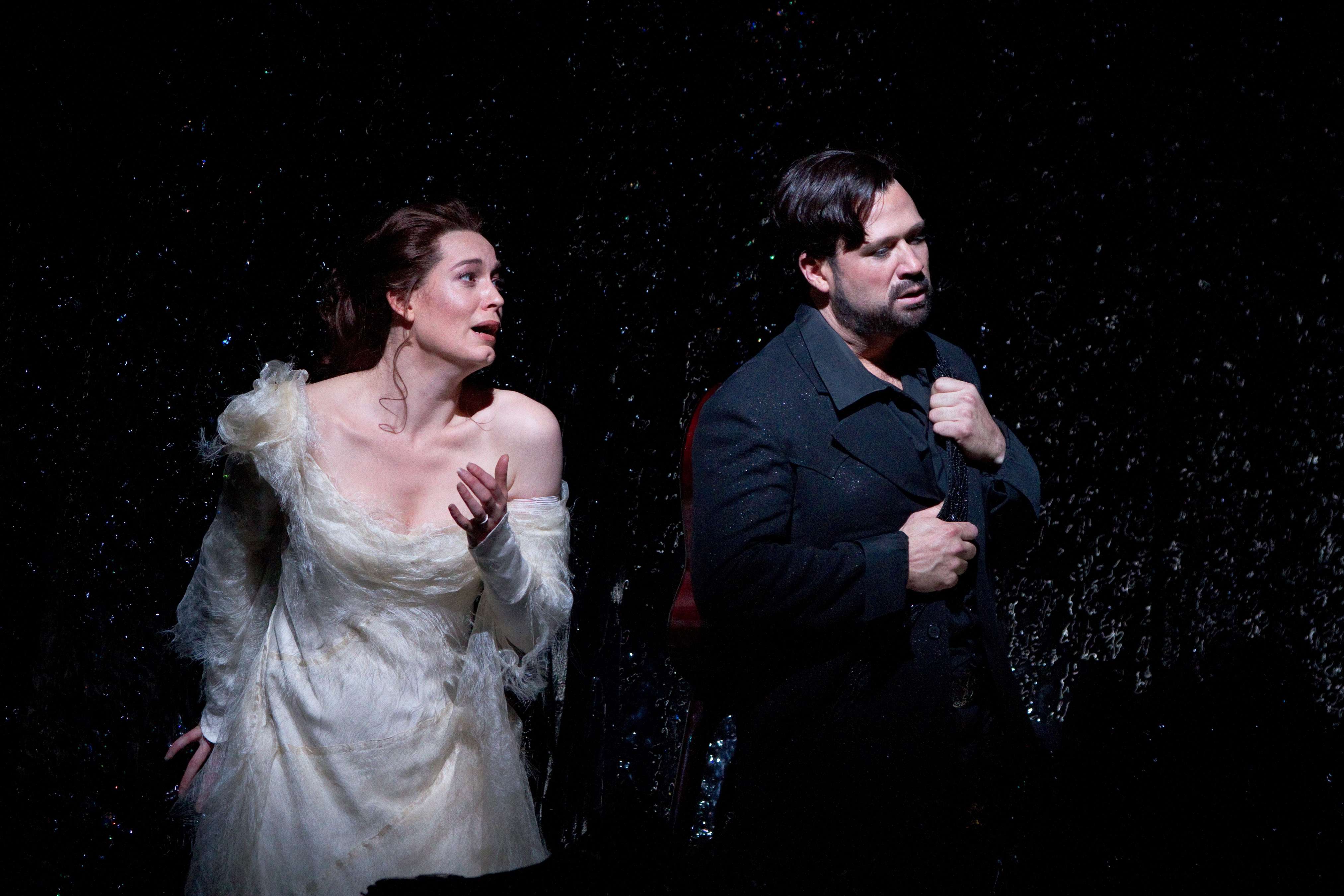|
Back
Love and Death Redux New York
Metropolitan Opera
04/29/2011 - and May 4, 7, 11, 14*, 2011
Christoph Willibald Gluck: Orfeo ed Euridice
David Daniels (Orfeo), Lisette Oropesa (Amor), Kate Royal (Euridice)
Metropolitan Opera Chorus, Donald Palumbo (Chorus Master), Metropolitan Opera Orchestra, Antony Walker (Conductor)
Jonathan Kelly (Harpsichord), Mark Morris (Production), Allen Moyer (Set Design), Isaac Mizrahi (Costume Design), James F. Ingalls (Lighting Design), Mark Morris (Choreographer)

K. Royal, D. Daniels (© Marty Sohl/Metropolitan Opera)
When David Daniels took the role of Orfeo in the 2007 premiere of this charmingly inventive and deeply moving Mark Morris production, he did so in the context of a real-world tragedy; Lorraine Hunt Lieberson, the marvelous mezzo soprano for whom the production had been conceived had died less than a year before. During the production’s first revival in 2009, another mezzo, Stephanie Blythe, sang the role of Orfeo. For a review of Ms. Blythe and her fellow cast members as well as an extensive discussion of Morris’s production, read here.
In his reform opera, Gluck stripped away the layers, plots and subplots of baroque opera and limited the characters to three. The chorus, of course, is also a character, as well as a commentator on the action. In the 2009 performance and yet again in this one, the Met chorus was the indisputable star. Under the inspired direction of Donald Palumbo, their contributions – whether lamentations, celebrations, or frightened and frightening cries from Hades – were simply ravishing. Perhaps, because I had already seen the production, I was less distracted by Morris’s costuming of the choristers as famous personages from the recent past and long past, although I did recognize – among others – George Washington, Princess Diana, Queen Victoria, Gandhi, Napoleon and Joan of Arc.
This time, I not only did not mind them too much; I actually felt that their presence made a valuable thematic contribution. This was particularly the case with reference to historical figures who had once wielded great power, but it was also true for those who were merely celebrities. Their worldly fame combined with their relegation to the role of helpless onlookers, sitting in Allen Moyer’s movable, multi-tiered grandstand, added an existential, timeless and a leveling dimension. Death comes to all and only love can conquer it – literally so with the restoration of Euridice to Orfeo at the end of the opera.
The role of Orfeo was written for castrato and, historically, has most often been sung by a contralto or mezzo. Countertenor David Daniels was a rather surprising replacement for Hunt-Lieberson. Returning to the role this season, Daniels sang with a rich, dark tone, great feeling, and an elegance of line. While certainly not approaching Blythe’s extraordinary power and range of vocal color, he was particularly effective in the opera’s main aria, “Che farò senza Euridice?” Kate Royal, in her Met debut, was a lyrical, dark-voiced Euridice with a lovely stage presence. Lisette Oropesa sang Armor with melting lyricism. She embodied the role to perfection from her grand entrance, being lowered down to the stage on wires, until her forgiving and rather jolly reappearance to give Orfeo and his love one more chance of earthly happiness.
Conductor Antony Walker made a distinguished Met debut. Under his leadership, the marvelous Met Orchestra played with élan and poignancy. Walker’s tempos were brisk when required. He was a thoughtful partner for the singers throughout. His conducting when the orchestra combined with the chorus was particularly fine. Lighter textures such as the ethereal winds accompanying Orfeo on his journey were stunning. As before, (except for the white garments they wore in heaven), I found the costumes of the dancers to be out of place and distracting. However, the dancing itself was beautifully realized and often quite moving.
David Daniels returns to the Met next season in the world premiere of The Enchanted Island, a baroque pastiche conducted by William Christie, Appearing alongside Daniels will be Joyce DiDonato and the indomitable and indefatigable Plácido Domingo who will add another role to his vast repertoire – Neptune.
Arlene Judith Klotzko
|